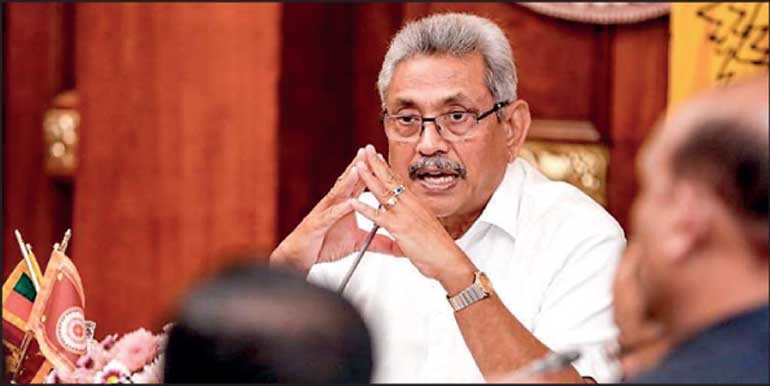Sunday Feb 22, 2026
Sunday Feb 22, 2026
Saturday, 18 January 2020 00:18 - - {{hitsCtrl.values.hits}}

President Gotabaya Rajapaksa
By Chandani Kirinde
The President’s Office yesterday directed all Provincial Governors to prioritise work in seven selected areas between January and March in view of the limited financial resources available in terms of Vote on Account – 2020 approved by the Parliament.
President Secretary P.B. Jayasundera informed all Governors that that the priority should be given to schools, hospitals, weekly fairs (sathi pola), public bus stations, street cleaning, communicable diseases, and waste management.
The Governors were informed that President Gotabaya Rajapaksa has given highest priority to eradicating poverty, and work has been prioritised to ensure low income and poverty-stricken communities living in rural, estate and urban areas, so that they could have the best possible access to improved facilities, which will provide opportunities to empower them.
The directive said provincial authorities should make an assessment of teacher and staff shortages in schools in such areas and take steps to deploy staff from places where there is excess to places of shortage to the best possible extent, at least within Divisional/District Secretariat areas, so that less inconvenience is caused for employees liable to such re-deployment.
Governors were also requested to assess underutilised and neglected buildings, structures, incomplete projects, such as housing schemes, water supply schemes, poorly maintained bridges and culverts, dispensaries, schools, Ayurveda hospitals, community centres, elders homes, child and maternity care centres, community centres, playgrounds, elephant fences and corridors, minor irrigations and tanks, anicuts, storage facilities and similar facilities in the provinces, and focus on rehabilitation instead of undertaking any new activities and instead get the best use of available facilities.
According to the directive from the Presidential Secretariat, all schools coming under the preview of Provincial Councils are to be provided with a clean environment, sanitation with adequate number of toilets, proper drainage system, well-maintained school playgrounds, green surroundings, access to quality drinking water facilities, child-friendly classrooms and activity arrangements.
Special attention is to be given to rural, plantation, and less popular urban schools with shanty and crowded neighbourhoods while measures be taken to ensure shops and traders do not facilitate drugs around the school environment.
The directive said all hospitals, dispensaries, maternity care centres, including Ayurveda hospitals, coming under Provincial Councils and Pradeshiya Sabhas need to be cleaned, provided with sanitation facilities with adequate toilet facilities, patient-friendly OPD arrangements, etc. Special attention is to be paid to all base hospitals and dispensaries for OPD services, pressure to be eased, and OPD operations at the National Hospital and parking facilities for vehicles are to be properly organised.
With regards to the weekly fairs, all sathi polas are to be kept clean before they commence on the designated day, and should be cleaned up after it is concluded, clean environments should be provided along with toilets, waste collection arrangements, and should be free from stray animals. Meat and fish stalls must be maintained with the best hygienic conditions, special arrangements need to be made to have safe parking arrangements for bicycles, motor bicycles, tractors, trucks, and cars, and no third-party people should be around such places. Traffic arrangements must be made on ‘pola day’ and supervision arrangements must be in place with proper official identification. These places need to be free from theft flashes, decorations, and other distractions.
Bus stations are to be maintained with commuter-friendly facilities, with all such places provided with adequate toilet facilities, and employees responsible for sanitation deployed to ensure these places are safe and clean at all times.
The authorities have also been directed to undertake the cleaning of all streets coming under the Pradeshiya Sabhas in township areas as well as rural, remote, plantation and shanty areas while measures are to be taken to prevent communicable diseases with a special focus on dengue prevention programs, including regular fumigation.
On waste management, the Pradeshiya Sabhas have been asked to work with local communities to manage their waste, along with developing scientifically specialised organic fertiliser, etc., with the assistance of local processing agencies.